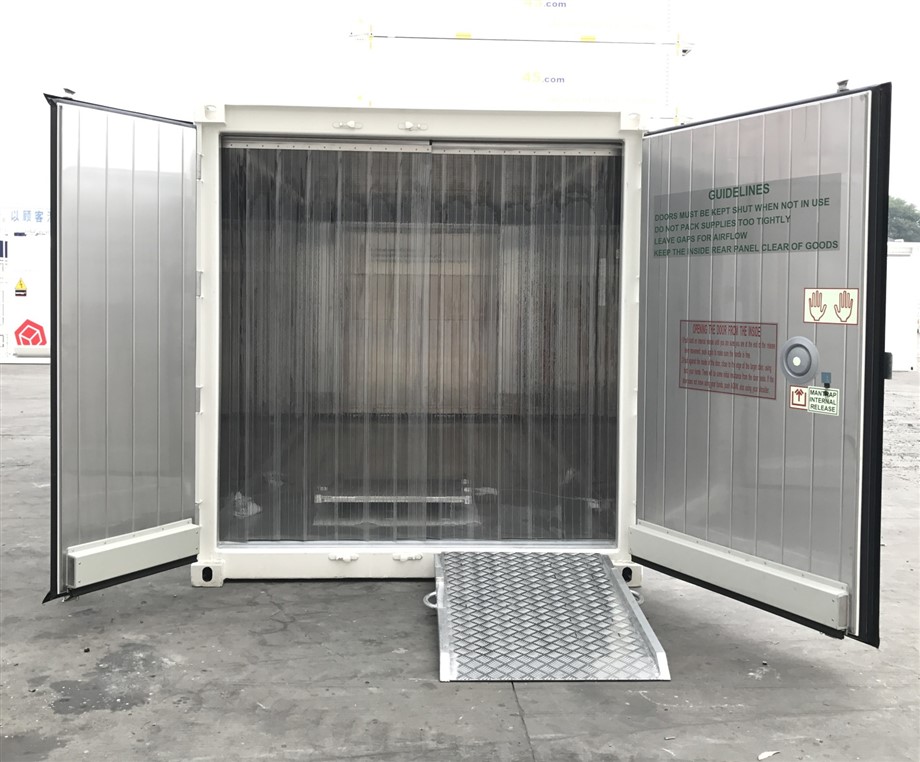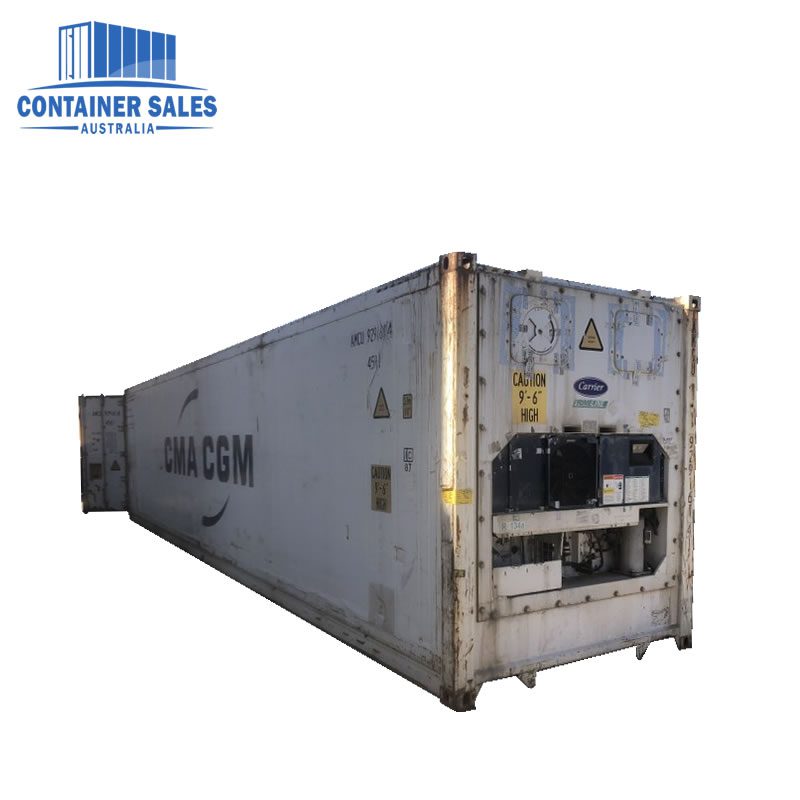All Regarding Cold Storage Containers: Vital Insights for Your Storage Needs
Cold storage space containers play a vital duty in the conservation of subject to spoiling items. They come in various forms, including cooled and insulated systems, each developed for particular storage requirements. Understanding the benefits and essential features of these containers is crucial for services intending to enhance their operations. As the demand for efficient storage space solutions expands, exploring the various options offered can lead to notified choices that impact both productivity and sustainability. What elements should one take into consideration when selecting the best container?
Kinds Of Freezer Containers
Freezer containers can be found in numerous kinds, each designed to meet particular temperature level control requirements. Amongst one of the most usual kinds are chilled containers, which maintain temperature levels between 0 ° C to 10 ° C, making them suitable for perishable goods like fruits, vegetables, and dairy products. Another type is the deep fridge freezer container, which operates at temperatures below -18 ° C, suitable for long-lasting storage of icy items such as meats and seafood.
Insulated containers offer temperature stability without energetic air conditioning, making them useful for short-term transport of temperature-sensitive products. Furthermore, there are portable freezer units, which provide flexibility in locations and are commonly used in events or seasonal operations. Blast refrigerators quickly decrease the temperature of warm foods, making certain safety and security and quality. Each kind offers a distinct purpose in numerous markets, from food service to drugs, stressing the value of choosing the right container for details storage space requirements.

Advantages of Utilizing Cold Store Solutions

Cool storage solutions expand the shelf life of items, lowering waste and raising earnings for businesses. By successfully handling supply with appropriate temperature level control, business can maximize their supply chains and improve functional effectiveness.
In addition, freezer facilities permit for versatile storage space options, suiting different quantity requirements and seasonal variations in demand (used 40ft refrigerated shipping containers). This flexibility helps services respond swiftly to market changes
Finally, employing cold store services can assure conformity with health and wellness policies, securing both customers and companies. In general, the calculated use freezer improves item monitoring while promoting sustainability and economic feasibility.
Trick Features to Try To Find in Cold Storage Containers
When picking cold store containers, numerous key functions merit careful consideration to protect peak performance and integrity. Temperature level control capacities are crucial; containers need to keep regular temperature levels appropriate for particular goods. Insulation quality additionally plays a substantial duty, as remarkable insulation decreases energy consumption and boosts temperature level stability.
Next, convenience of accessibility and loading is important; containers must provide user-friendly layouts for reliable handling and organization. Toughness is one more essential aspect; weather-resistant materials assure durability and protect contents versus environmental elements.
Additionally, flexibility attributes, such as built-in wheels or raising factors, facilitate transportation, while adjustable formats permit tailored storage space services.
Monitoring systems, consisting of temperature alarms and remote monitoring, offer real-time updates, making particular that conditions stay ideal. By concentrating on these features, customers can select chilly storage containers that fulfill their operational demands efficiently.
Choosing the Right Freezer Container for Your Needs
Picking the right chilly storage space container requires a thoughtful evaluation of functional needs and specific requirements. Variables such as the type of products being kept, temperature level level of sensitivity, and volume ought to be focused on. As an example, perishable food items may demand containers with stringent temperature controls, while pharmaceuticals may need specific problems to maintain efficacy.
In addition, possible users ought to think about the container's dimension and flexibility. A bigger unit may be needed for mass storage space, while smaller, portable choices could be suitable for short-lived or on-site demands. Insulation top quality and power effectiveness are likewise important, as these will certainly affect operational costs and temperature level security.
Last but not least, conformity with sector regulations and criteria is vital, especially in markets like food and medical care. By meticulously reviewing these facets, individuals can select a cold store container that efficiently meets their one-of-a-kind needs and assurances optimal storage space conditions.
Ideal Practices for Preserving Cold Storage Issues
Preserving ideal freezer problems is vital for maintaining the high quality and safety of temperature-sensitive items. Frequently keeping an eye on temperature and moisture degrees is important; using trusted digital thermostats and hygrometers can offer exact readings. In addition, proper insulation of cool storage containers assists minimize temperature variations and energy loss.
Executing a first-in, first-out (FIFO) system assures that older inventory is utilized prior to more recent stock, minimizing waste (used 40ft refrigerated shipping containers). In addition, maintaining an organized format within the storage room enables much better air flow and minimizes the danger of cross-contamination
Regular maintenance look at devices, such as seals and compressors, are necessary to stop breakdowns. Team training on finest methods for filling and dumping products helps maintain temperature stability. Lastly, keeping doors shut as long as feasible restrictions warmth exchange, assuring that the cold store atmosphere stays secure and reliable in maintaining valuable items.
Price Factors To Consider for Cold Store Solutions
When examining chilly storage solutions, it is necessary to take into consideration the initial financial investment prices together with ongoing operational expenditures. A comprehensive breakdown of these prices can disclose considerable long-lasting cost savings potential for businesses. Recognizing these monetary aspects aids stakeholders make educated decisions concerning their cold store my sources demands.

First Financial Investment Costs
The economic landscape of chilly storage space containers provides different preliminary financial investment expenses that services need to think about. These expenses normally include the purchase or rental price of the containers, which can vary based upon insulation, type, and dimension top quality. In addition, expenditures associated to retrofitting existing structures to accommodate cold storage must be factored in, specifically if specialized tools is needed. Setup prices, consisting of electrical work and refrigeration systems, additionally add to the general initial financial investment. Organizations must not neglect transportation prices for providing containers to their desired area. Prospective customization choices, such as shelving or temperature tracking systems, can even more influence the initial economic investment. Mindful budgeting for these elements is essential for effective cold store execution.
Operational Costs Malfunction
Operational costs for freezer solutions incorporate several crucial price considerations that organizations should browse. Key elements consist of energy expenses, which can be significant due to the requirement to keep low temperatures. Upkeep expenditures are also considerable, as normal servicing is important to assure equipment operates effectively and continues to be he has a good point compliant with health and wellness standards. Furthermore, labor expenses might emerge from the need for specialized personnel to handle and check the storage setting. Insurance costs are one more factor to consider, as firms must safeguard their investments versus possible losses. Any type of prospective regulative conformity prices have to be factored in, as businesses might require to spend in systems that stick to food safety and security and ecological policies. Comprehending these expenses is critical for reliable budgeting.
Long-Term Financial Savings Possible
Buying freezer solutions offers significant long-term savings capacity, transforming first expenses into financial performance gradually. By lessening putridity and waste, businesses can boost their revenue margins significantly. Advanced insulation and energy-efficient systems reduce energy expenses, which accumulate over the life-span of the devices. Chilly storage containers usually need much less constant maintenance contrasted to conventional refrigeration approaches, leading to lower repair costs. The ability to shop items for prolonged durations without compromising top quality allows services to profit from market variations, optimizing profits. Additionally, the scalability of chilly storage space services allows companies to adjust to changing demands without incurring too much expenses. Generally, these variables add to a compelling situation for freezer as a cost-efficient investment technique.
Often Asked Concerns
For How Long Can Food Be Kept in Cold Storage Containers?
The duration food can be saved in cold store containers varies by kind. Usually, perishable things last from days to weeks, while icy foods can stay secure for months, depending upon proper temperature and storage problems.
Are Freezer Containers Energy-Efficient?
The energy efficiency of cool storage containers differs based on layout and insulation high quality. Modern units commonly use advanced innovation to decrease power intake, eventually adding to reduced operational expenses and ecological effect in long-term usage.
Can Freezer Containers Be Personalized for Specific Requirements?
Cold storage space containers can certainly be personalized to fulfill details needs. Adjustments might consist of temperature controls, size changes, and added attributes, allowing users to tailor services effectively for different storage space demands and operational preferences.
What Are the Usual Sizes of Cold Store Containers?
Cold storage containers normally come in standard dimensions such as 10, 20, and 40 feet. These dimensions suit various storage space demands, making sure flexibility for organizations needing temperature-controlled atmospheres for sensitive materials or subject to spoiling products.
Do Freezer Containers Require Special Authorizations for Usage?
Cold storage containers typically need unique licenses for use, depending on local laws and meant applications. Authorities may mandate permits to guarantee security standards, environmental compliance, and appropriate operational techniques are read this article maintained throughout their application.
Cold storage containers come in different types, each made to fulfill particular temperature level control requirements. In addition, cold storage space facilities enable for flexible storage alternatives, accommodating different quantity needs and seasonal changes in need. Choosing the ideal cool storage container needs a thoughtful analysis of operational needs and specific requirements. The economic landscape of cold storage containers provides numerous initial investment expenses that organizations need to take into consideration. Cold storage containers can certainly be personalized to fulfill specific requirements.